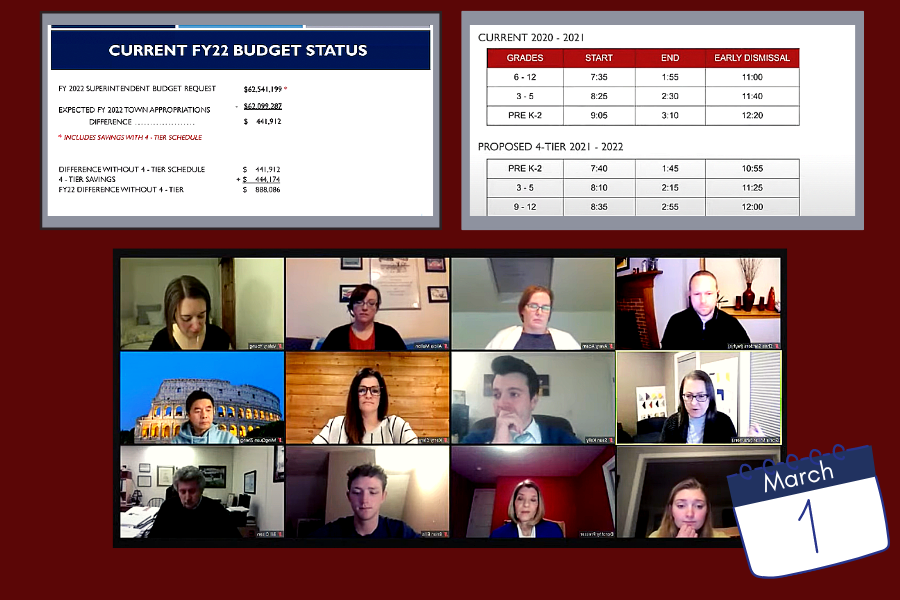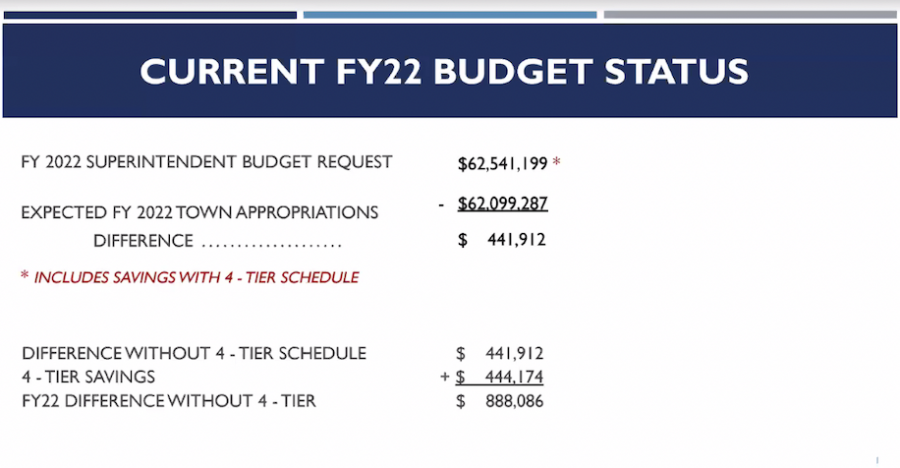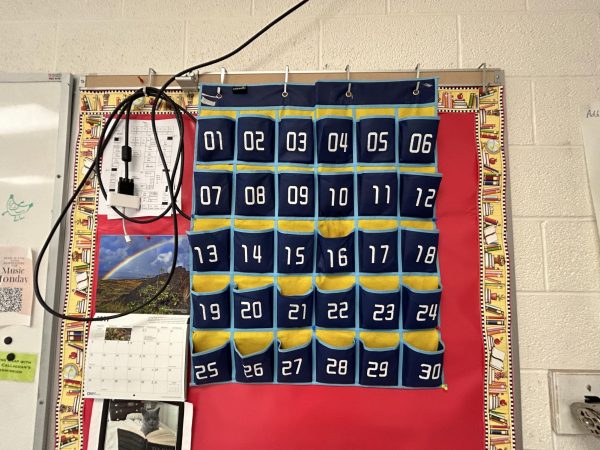Four main takeaways from 3/1 school committee meeting
The March 1 school committee meeting discussed the 4-tier busing system, superintendent selection process finalists, and the FY22 budget.
March 2, 2021
The Westford School Committee discussed the new 4-tier model for the fall 2021 year, as well as the next steps in the superintendent selection process after the revelation of the four finalists at the March 1 meeting. Below, are the four major takeaways from the night.
I. Superintendent Selection Process Finalists
Following months of work, the Superintendent Preliminary Screening Committee announced the four final superintendent nominees: Dr. Margaret Adams, the Assistant Superintendent for Teaching and Learning at Melrose Public Schools, Dr. Christopher Chew, the Stony Brook Middle School principal, Dr. Matthew Janger, Arlington High School’s principal, and Dr. Michele Shannon, the Executive Vice President of Client Services for the New York Leadership Academy.
There will be a chance for the public to interact with the finalists and ask questions through virtual meet and greets, starting on March 11. Specific information and meeting links will be found in the section of the Westford Public Schools website where Superintendent Search information is posted. Finalists will also be interviewed by the school committee and asked 10-12 questions to get to know them better which will also be for public viewing.
II. Questions Regarding New Westford Academy Schedule
Additionally, WA Principal James Antonelli clarified several aspects of the new five-block schedule for the 2021-22 school year.
A question was asked regarding the implementation of the schedule— if WA will adopt the new schedule regardless of the timing shift proposed by the 4-tier model. To that, Antonelli responded in the affirmative.
However, he mentioned that if WA was to remain in the earlier time slot due to the 4-tier proposal failing to pass, the schedule may be modified to have two seventy-minute blocks instead of the longer eighty-one-minute block at the end of the day.
“I’ve received a lot of great feedback after my Friday Email from parents [regarding the new WA schedule], that the less frenetic pace and longer blocks […] will give us a little bit more time to figure out what we need to do in between classes. […] So far, it has [the schedule] been well received,” Antonelli said.
Another common point of confusion for the Westford public was concerning the eight-one-minute block at the end of the day, and the uses of the last twenty minutes of the day. School committee member Avery Adam inquired about the purpose of the last twenty minutes, mentioning that many in the community think that it will be “wasted time” in the school day.
Antonelli maintains that all eighty minutes of the last block will be instructional and academic time. In regards to the early sports dismissals, he says that athletic coordinator Jeff Bunyon will release schedules ahead of time as to what away games will take place during the week for athletes to be dismissed from their classes. This is to ensure that disruptions will be minimized and all students get around the same amount of instructional time.
“This is a great opportunity for all the things we have in mind for social-emotional challenge success. […] I want to get away from [the idea] that [the last part of the day] is a [separate] twenty-minute block. It’s an eighty-minute block [and the last twenty minutes are] going to be used for a variety [of things],” Antonelli said.
III. Fiscal Year 22 Budget and Explanation For Change in Busing
The numerous changes in busing and school schedules have caused confusion in the community, which Superintendent Bill Olsen addressed from a budgetary lens. New growth is usually associated with residential development and marks a beneficial change in a district. Unfortunately, this year, new growth has decreased in Westford as a result of the pandemic which heavily impacts fiscal year 22’s budget and requires some cuts. The decreased new growth has affected the town’s revenues and has, accordingly, impacted WPS’s budget.
Every year, WPS asks for an increase in budget appropriations, which is the amount of money WPS receives from the town to match the schools’ spending levels. Over the past eight to ten years, the average annual percent increase in budget appropriations has been 3.3%, but that percentage has also notably decreased as a result of reduced new growth. This year, budget appropriations are at an all-time low of 1.4%.
“[The new growth] dropped again going into fiscal 22 that has been exacerbated by the significant loss of federal, state and local revenue as a result of the COVID-19 pandemic,” Olsen said.
Due to all of these reasons, resources are scarce which requires prioritization of goals. The following were chosen to be prioritized:
- Maintaining class size guidelines
- Addressing the social-emotional wellness of students
- Expanding cultural awareness in many aspects of education
- Technological support
- Maintaining a safe, healthy learning environment
Keeping these priorities in mind, there are also areas where the budget needs to be reduced in order to meet the town’s appropriations. Olsen stated over 90% of the budget goes towards salaries and mentioned staffing and programs may be reduced. Another option would be to modify ancillary services such as busing, increase parent/student fees or deplete all revolving funds/ school choice funds.
Taking the route of ancillary services modification, the busing system may be a 4-tier system next year, allowing $444,174 to be saved. Without a 4-tier system, Westford would have a $888, 086 budget deficit; however, due to the $444,174 savings from the 4-tier system, the new budget deficit would only be $444,912.
“If we don’t have a 4-tier [system] […], we are back at about a $900,000 shortfall,” Olsen said.
IV. Questions Regarding the 4-Tier Plans
After Olsen presented the budget for the next year, several school committee members brought up questions and concerns regarding the plans and the budgetary direction the school district will be taking in the future.
Adam reinforced the reason for four-tier busing, reminding the public that its proposal is for the “health” of the district and the school budget. She once again established that if the proposal doesn’t pass, “hard cuts” will have to be made, and the cuts will not be ideal for the district, faculty, and students.
“This is a financial decision, and we are trying to reap as many benefits of this financial decision in mental health improvements, in sleep improvements, in block scheduling. We’re trying to make lemonade out of the lemons that [are being tossed at us right now],” Adam said.
Adam and Miller, as per what they witnessed arise as a prominent issue in the Westford public, also questioned Olsen about before and after school care—primarily before school care for middle school students whose parents cannot drop their children off at school as late as 9:05 AM. Olsen responded by saying that a before-school program will most likely be brought back. Although nothing regarding the earlier drop-offs has been finalized, there will be discussions with the middle school principals about the reinstatement of the program.
Additionally, school committee member Valery Young stated the dramatic change in the start times, which essentially “flips” the timings for the high schoolers and middle schoolers with the younger K-5 students may be a large cultural and community-wise shift that isn’t ideal for the town. This is especially due to the implications and effects of the proposal on before and after school care, athletics, and extracurricular activities.
“My personal opinion is that […] we’re not ready for that [the proposed timings with 4-tier model], especially in a year after a pandemic. […] I’d be interested in a proposal that mirrors the current age ordering with high schoolers first, then middle school […]. I know it doesn’t give the later start time for the older students [to have more sleep], […] but I think it [the 4-tier plan] would be better rolled out if we [introduce it slowly],” Young said.
On March 8, the school committee will make a final vote on the model.




















